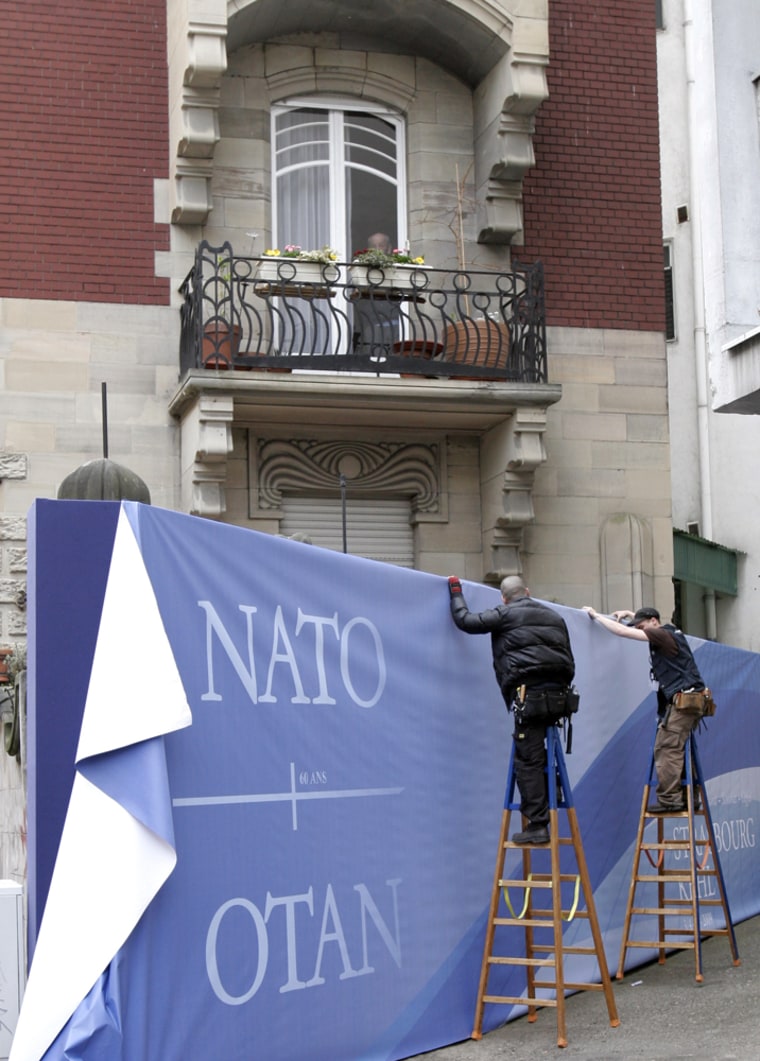A stalemated Afghan war and the appearance of a new, untested American president will dominate a crowded agenda for the nations of NATO gathering this weekend at the alliance's 60th anniversary summit.
Afghanistan is likely to get most of the attention at the summit, coming a week after President Barack Obama announced a revised war strategy that counts on deeper military and civilian contributions from the allies.
The summit will be Obama's first chance to appeal directly to alliance heads of government for more help in the deadlocked U.S. campaign to defeat the Taliban. The Afghan campaign is the only ground war that NATO has fought since it was founded in April 1949.
Also on the agenda: pressing for a fresh start with nonmember Russia in the wake of this week's bilateral agreement with the U.S. to jump-start nuclear reduction talks; welcoming France back into NATO's military wing after a 43-year absence; and advancing prospects for pushing NATO's borders farther eastward.
'A highly consequential summit'
"I think this is going to be a highly consequential summit," said Nicholas Burns, a former U.S. ambassador to NATO who was the State Department's No. 3 official until last spring. "This summit is going to revolve around a couple of big issues, and Afghanistan is going to be by far the most important."
The allies are unlikely to offer significant additional combat forces for Afghanistan at the summit. But they are expected to embrace Obama's focus on nonmilitary aspects of stabilizing Afghanistan and to underscore their shared view that Afghanistan cannot be allowed to regress back into an al-Qaida haven.
Obama's pitch on Afghanistan may be helped by his decision to end U.S. military involvement in Iraq, a war that hardened the reluctance of many European nations to heed appeals from the Bush administration for more troops.
NATO has led international security forces in Afghanistan since 2003. But most of its members have seen the core mission as humanitarian rather than combat.
Burns, now a professor of diplomacy and international politics at Harvard's Kennedy School of Government, said in a telephone interview that France's return to full membership in the alliance also is important. France withdrew from the military side of NATO, while remaining part of its political body, in 1966.
"It's a very big deal" to have France back, Burns said. "It puts one of the strongest militaries in NATO right back in the center of the military part of the alliance."
'Birthday celebration'
The 60th anniversary summit, being held at Strasbourg, France, and Kehl, Germany, on opposite sides of the Rhine river, is meant to be more than a celebration of six decades of trans-Atlantic security and political ties. The leaders will also grapple with hard questions about managing relations with Russia, which views NATO as an anachronism, and determining what role NATO should be playing on the world stage.
The summit leaders are expected to formally launch work on a new "strategic concept" for NATO — essentially an outline of it's reason for being in the 21st century. It has not updated its core concept since 1999, prior to the fundamental shift in global security triggered by the 9/11 attacks.
Daniel Fata, an adviser to Defense Secretary Robert Gates on NATO and European issues until last fall, said it's probably too early in the Obama administration for the summit to make decisions on the harder issues.
"It should be seen as only a birthday celebration," Fata, now a European affairs expert at the Cohen Group, an international consulting firm, said in a telephone interview.
At a symbolic level, the sharing of French and German summit venues is central to that celebration: It highlights the reconciliation of former World War II enemies whose cooperation is at the core of postwar European integration.
Relations with Russia
Also on the agenda: christening Albania and Croatia as new members of the alliance and wrestling with differences over how, when and whether to add the former Soviet republics of Ukraine and Georgia.
Those questions are part of a more complex calculation about improving NATO relations with Russia. Alliance ties were severed after Russia invaded Georgia last August, but NATO foreign ministers decided in early March to restore relations while refusing to recognize a Russian "sphere of influence."
A major impediment to improved ties to Russia is Moscow's vigorous opposition to plans — pushed hard by the Bush administration but not yet embraced by Obama — to extend a long-planned U.S. missile defense system to eastern Europe. The summit meeting is not expected to take new steps on that issue.
Similarly, the Russians oppose U.S.-backed efforts to move Ukraine and Georgia toward NATO membership. Some NATO members are reluctant to defy Russia on this, in part because they think democratic gains can be achieved in Ukraine and Georgia by offering them a special NATO association short of membership.
The depth of disagreement over Russia, Afghanistan and the proper role for NATO outside Europe is unlikely to be exposed at the NATO summit, where the public focus will be on celebrating 60 years of unity.
"For the United States the important thing right now is what the allies will do for us outside of Europe," said Robert Hunter, a senior adviser for RAND Corp. and a former U.S. ambassador to NATO. Many of the allies, including Germany, want to limit the scope of NATO's involvement beyond its borders.
"Consequently, there is an emerging division of labor in NATO, where the U.S. does the military part while the others (do) nonmilitary and training," Hunter said.
More on:
